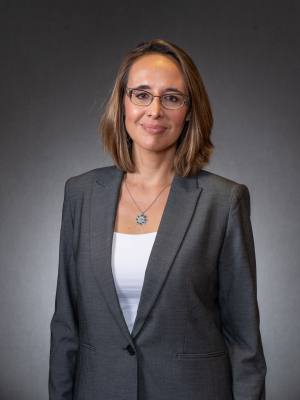Putting a Spotlight on Environmental and Feminist Economics
China's rise in the global economy over the past four decades has also given rise to an environmental crisis that has critical implications for the global economy, according to Chiara Piovani, associate professor of economics. Piovani studies the social, economic, and environmental challenges of China's ecological footprint.
"China has become the world's largest greenhouse gas emitter, greatly accelerating the climate emergency," said Piovani, noting that the Chinese leadership began to take steps to address China's environmental crisis in the early 2000s.
"The government has targeted energy efficiency, energy conservation, and low-carbon energy sources as the key instruments to improve the environmental conditions of the country," she said. "As a result of these efforts to shift away from fossil fuels, China has become the world's largest investor in renewable energy."
While these efforts are laudable, they are associated with contradictions and limitations, said Piovani.
"A solution to China's environmental crisis not only requires much bigger and consistent policy measures on the part of the country's government, but also requires that we critically evaluate the structure of the global economy," she added.
"In this context, my research interest revolves around understanding how improvements in living standards can be pursued in a manner that is consistent with environmental sustainability."
Piovani's research also extends to feminist economics in which she analyzes the social consequences of neoliberalism, with a focus on the effects of the 2008 global economic crisis.
"I am especially interested in using a gender perspective to evaluate how the economic changes under neoliberalism have affected mental health. Psychological disturbances have become an increasing public health concern worldwide," she said. "Mental health remains a neglected dimension in the analysis of social and economic well-being."
Piovani is a consultant with the United Nations Commission on Trade and Development (UNCTAD) - Division on International Trade in Goods and Services, and Commodities - Gender and Development Programme. Last September, she was invited to speak at the World Trade Organization Public Forum in Geneva. The session was titled, "Gender and Trade Policy: Fostering a Virtuous Circle."
"My talk was about the Gender and Trade Toolbox, which UNCTAD released in July 2017," said Piovani. "The Toolbox consists of an analytical framework, which allows for an ex-ante evaluation of the gender impact of trade policies. This is an important project, as there is shared awareness that trade liberalization can have either a positive or negative effect on women, even when there is a net positive effect on a country as a whole. The effect depends on whether trade liberalization creates more opportunities and markets for women or whether they lead to a contraction of the sectors in which women work."
Piovani's passion about issues related to poverty and income/wealth inequality began to germinate as an undergrad student in Milan, Italy, where she grew up. The desire to better understand the drivers of these issues and to learn how to tackle them led her to pursue economics at the graduate level at the School of African and Oriental Studies in London. It was here that she discovered that mainstream or neoclassical economics is not the only way of doing economics.
"I learned about the existence of 'heterodox economics,' which was and is, in my view, much more apt to explain the role of power in our economic system and the drivers behind socio-economic inequities and ecological exploitation," said Piovani. She decided to pursue a PhD in economics from the University of Utah to further explore heterodox economics.
In 2011, Piovani joined the University of Denver department of economics, "which has a great reputation for supporting alternative economic perspectives, economic history, and history of economic thought." She teaches courses on environmental economics, micro-macroeconomics history and theories, China and global economy, and international economics.
"Teaching economics for me is a privileged occasion to provide students with the necessary tools to better understand socio-economic phenomena, form their vision of the world, and become actively engaged in making the world a better place," said Piovani.
"My approach to teaching has been to provide students with the theories and applications offered by mainstream economics, while at the same time highlighting their limitations and presenting the alternative perspectives offered by heterodox economics," she added. "My goal is to make them aware that economics, as a social science, is subject to change and internal debate. Economics, therefore, necessarily needs to be studied as part of the political, social, and institutional context.



